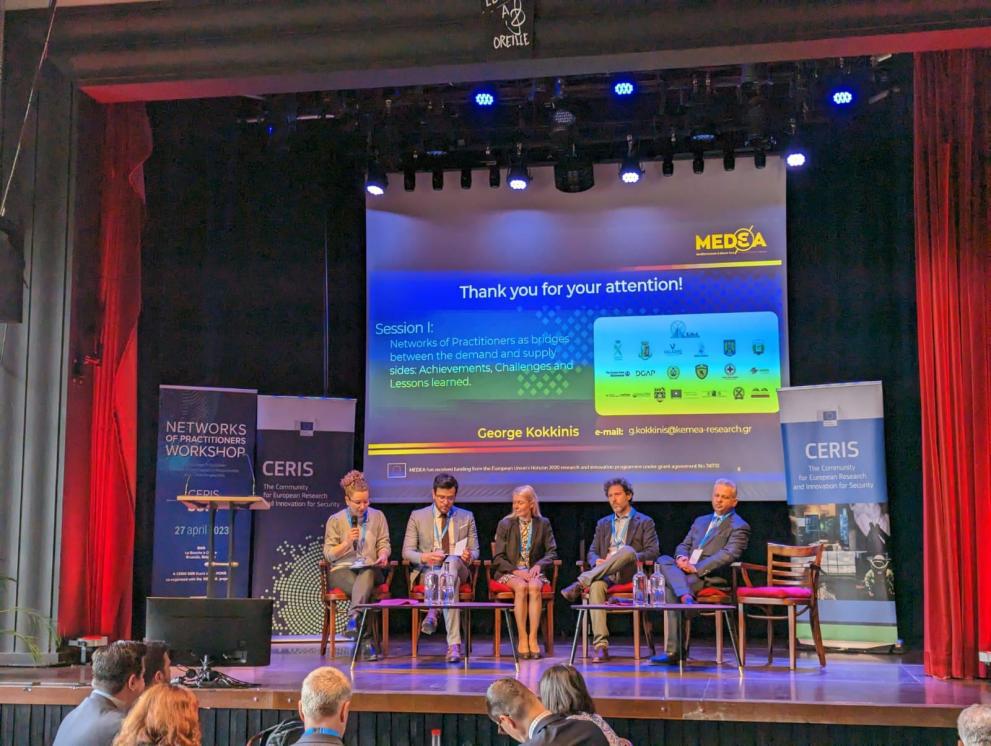
Bringing together all ‘Networks of Practitioners’ in the EU security research domain and facilitating networking among networks was the objective of the CERIS workshop with a view to strengthening security research and innovation, which took place on 27 April 2023 in Brussels. 95 participants, including representatives from all relevant projects and various networks, from small and medium sized enterprises, researchers, academia and policy makers took part in the workshop, which was organized with the support of the H2020 MEDEA project.
All these actors were using the workshop to inform each other about the results of the work carried out in the different networks. They discussed different methods for demand and supply-driven capability-building, and how forward-looking approaches can help for identifying threats and gaps in the middle to long-term. The participants examined how to exploit the results of the work of the different networks and how to integrate them in the future activities of EU security research and innovation.
Mr Giannis Skiadaresis, from the European Commission (DG HOME.F2) and Mr George Kokkinis (KEMEA), coordinator of the MEDEA project, opened the workshop. Both were underling the importance of the work done in the networks of practitioners and the need to bring all stakeholders together in this workshop.
Then, experts shared their knowledge, experience and opinions in three sessions:
Session I focused on the reasons and motivation for creating networks of practitioners. EU security research covers a wide area, which makes it difficult to engage with all practitioners and to make them interact with other players such as academia and industry. Joint efforts of all these stakeholders, who often do not communicate sufficiently with each other, are needed to start the cooperation. Panellists mentioned a lack of flexibility of public authorities and practitioners when it comes to buying innovative technologies, which prevents them from benefiting from the results stemming from security research. One solution could be the involvement of practitioners and public authorities in Pre-Commercial Procurement projects. One successful example in this regard is the ARCSA project, providing a platform which brings together security practitioners and other actors to identify the capability gaps on hybrid threats and to cooperate in finding solutions.
Session II triggered the discussion in how far the networks follow a specific methodology for engaging practitioners with other actors and how challenging or useful it is. Panellists emphasized the importance of networks identifying the real needs and the importance of organising dedicated thematic workshops using specific scenarios that involve all stakeholders (e.g. practitioners, researchers and technology suppliers). As a threat for one country today might become a threat for another country tomorrow, it is important to share knowledge, mindsets and perceptions, and to come up with concrete recommendations.
Additionally, experts discussed the need to involve citizens and the general public in networks of practitioners at certain stages. Standardization is another key issue. For instance, standardization in firefighting among the EU Member States could optimize the response to incidents across Europe.
In session III, the discussion focused on the views of the networks on how they can ensure knowledge transition in the long-term. Empowering the members of the networks and creating the feeling that they own the network is essential. On the other hand, the European Commission and EU agencies can play a role ensuring that the knowledge from the networks is spread among the stakeholders:
In this context, panellists discussed how to reach the capability requirements through strategic planning such as strategic risk analysis, scenario building, quality control mechanisms, contingency planning, assessment, and lessons learnt. In line with its mandate, FRONTEX is pursuing all these elements in close cooperation with the Member States. FRONTEX has prepared a methodology on the capability building process in border management which is a public document.
Another tool is the EUROPOL repository which can be accessed easily, with new tools coming out from EU-funded projects. There is also a Wiki tool with further information about tools, e.g. whether they are commercial or open source.
DG ECHO promoted a new dissemination tool for their projects, aiming at a long-term availability of project outcomes. In each project page there is a knowledge library, which will still be optimised in terms of user friendliness and capacity of information.
The workshop was closed by concluding that there is not just one, but there are many replies how to ensure sustainability of project results. There was general agreement that networks do not own the results of their work but should transfer them through collaboration and by using synergies.
Details
- Publication date
- 11 July 2023
- Author
- Directorate-General for Migration and Home Affairs
